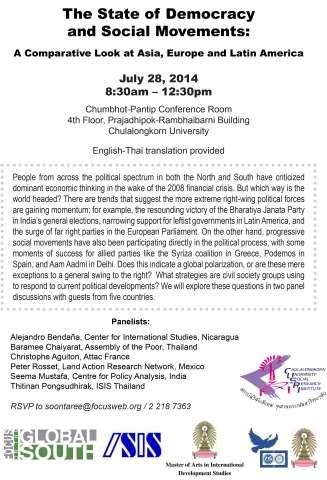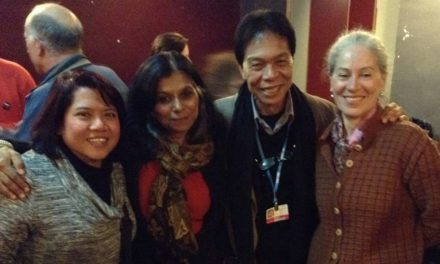Join us on Monday, July 28, 2014, for two panels with international guests who will examine the state of democracy and how social movements are responding to political shifts in Asia, Europe, and Latin America.
Location: Chumbhot-Pantip Conference Room, 4th Floor, Prajadhipok-Rambhaibarni Building, Chulalongkorn University, Bangkok (link to map)
English-Thai translation provided
People from across the political spectrum in both the North and South criticized dominant economic thinking in the wake of the 2008 financial crisis. But which way is the world headed?
There are trends that suggest the more extreme right-wing political forces are gaining momentum; for example, the resounding victory of the Bharatiya Janata Party in India’s general elections, narrowing support for leftist governments in Latin America, and the surge of far right parties in the European Parliament.
On the other hand, progressive social movements have also been participating directly in the political process, with some moments of success for allied parties like the Syriza coalition in Greece, Podemos in Spain, and Aam Aadmi in Delhi. Does this indicate a global polarization, or are these mere exceptions to a general swing to the right? What strategies are civil society groups using to respond to current political developments?
We will explore these questions in two panel discussions with guests from five countries:
9:00 am: The State of Democracy
Alejandro Bendaña, Center for International Studies, Nicaragua
Seema Mustafa, Centre for Policy Analysis, India
Thitinan Pongsudhirak, ISIS Thailand
10:30 am: The Role of Social Movements
Christophe Aguiton, Attac France
Peter Rosset, Land Action Research Network, Mexico
Baramee Chaiyarat, Assembly of the Poor, Thailand
Sponsored by: Focus on the Global South, Chulalongkorn University Social Research Institute, the Rotary Peace Center at Chulalongkorn University, and ISIS Thailand.
RSVP by emailing [email protected] or on Facebook.






![[IN PHOTOS] In Defense of Human Rights and Dignity Movement (iDEFEND) Mobilization on the fourth State of the Nation Address (SONA) of Ferdinand Marcos, Jr.](https://focusweb.org/wp-content/uploads/2025/07/1-150x150.jpg)

